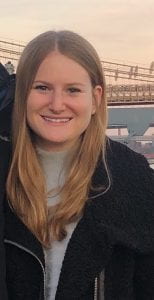Lauren Aronson joined us on October 2nd for our first virtual edition of the Young Alumni Series. She graduated from Human Ecology as a Human Development major, has worked as a Behavior Specialist, and recently got her Master’s in Social Work from NYU. Currently, Lauren works as a School Social Worker at Northside Center Day school, providing counseling to support children with social, emotional, and behavioral challenges, while also working part time at the Northside Clinic. The overarching focus in her work is on social issues and their impact on youth mental health.
How was the transition from undergraduate to graduate school? Can you talk more to your experience(s)?
I took a gap year between undergraduate and pursuing my Master’s Degree in Social Work in order to gain some work experience and take time to decide which graduate school route I would take, as I was initially deciding between completing my Master of Social Work or a PsyD. That one year turned out to be invaluable, as it gave me the time to figure out not only what my goals were career-wise, but also what my life goals were, and determine which graduate school path best enabled me to meet those goals. My transition into graduate school was generally smooth, in large part because of how my undergraduate and gap year prepared me for my program. Cornell, and specifically Human Development, prepared me in terms of managing the rigorous coursework in graduate school, especially when it came to completing multiple research papers in a short period of time during midterms and finals. Having a year of full-time employment also prepared me for the fieldwork component of my master’s program, as I came in with some concrete clinical skills and knowledge, and more generally, experience working in a professional setting.
What career and Cornell related advice would you give HD majors? Human Ecology students in general?
For both Human Development majors and Human Ecology students in general, I definitely recommend taking advantage of the many opportunities offered within Human Ecology to get involved in research. Even if you do not plan to pursue a career or further education involving research, having those research skills and experiences on your resume can potentially set you apart from other candidates, and can be useful skills in any field you pursue. Participating in a research lab also provides the opportunity to cultivate close relationships with professors who can get to know you outside of large lectures, which is important for networking and for getting academic recommendation letters from those who can actually speak to you and your specific skills and strengths. For graduating students, one thing I wish someone told me as a senior seeking employment would be to not set my expectations so high, and remember that “entry level” means just that. Remember that your first job is just the first step into your career, and that it may not be exactly where you envisioned yourself, but that you are just getting started, and I guarantee you will learn something from it. My job during my gap year was not at all where I saw myself working, and was not the field or population I was interested in working with. Regardless, I learned so much and gained new skills and knowledge that I still utilize in my work today. Be open-minded and open to learning, you’ll get where you want to be!
How have your values and goals translated into what you’re doing now?
My values, passions, and career goals in childhood trauma, social justice and advocacy, and research, have all translated to the work I am doing today. I knew by sophomore year of college after taking Developmental Psychopathology that my interests and passions were in child and adolescent mental health. When it came to deciding on which graduate route to take, I found myself really drawn to social work because of its emphasis on the “person-in-environment” perspective and understanding how all contexts in an individual’s life shape their mental health, and how it blended clinical work with social justice work and advocacy, as well as research. I was interested in the “why” and the “how” of child and adolescent mental illness, which led me to focusing my coursework and fieldwork in graduate school on child and adolescent trauma, and understanding how social issues related to poverty, education, race, gender and sexuality, and incarceration impact youth mental health. Currently, I work full-time as a School Social Worker with elementary age children experiencing emotional and behavioral challenges in school. I also work part time as a therapist at a community outpatient mental health clinic, providing therapy for children and adolescents to support with mental illness and other significant life stressors. Lastly, I do volunteer research on behavioral/mental health interventions with LGBTQ+ youth.

